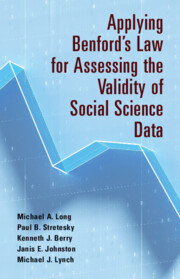Book contents
- Applying Benford’s Law for Assessing the Validity of Social Science Data
- Applying Benford’s Law for Assessing the Validity of Social Science Data
- Copyright page
- Contents
- Figures
- Tables
- Preface
- Acknowledgments
- Chapter 1 Introduction
- Chapter 2 Validity and Self-Reported Data
- Chapter 3 Benford’s Law and Assessing Conformity
- Chapter 4 Data Characteristics and the Workflow of Benford Agreement Analysis
- Chapter 5 Benford Agreement Analysis of the Sea Around Us Project’s Fish-Landings Data
- Chapter 6 Benford Agreement Analysis of US and Global COVID-19 New Cases Data
- Chapter 7 Assessing the Impacts of Problematic Benford Validity
- Chapter 8 Conclusion
- References
- Index
Chapter 4 - Data Characteristics and the Workflow of Benford Agreement Analysis
Published online by Cambridge University Press: 09 November 2023
- Applying Benford’s Law for Assessing the Validity of Social Science Data
- Applying Benford’s Law for Assessing the Validity of Social Science Data
- Copyright page
- Contents
- Figures
- Tables
- Preface
- Acknowledgments
- Chapter 1 Introduction
- Chapter 2 Validity and Self-Reported Data
- Chapter 3 Benford’s Law and Assessing Conformity
- Chapter 4 Data Characteristics and the Workflow of Benford Agreement Analysis
- Chapter 5 Benford Agreement Analysis of the Sea Around Us Project’s Fish-Landings Data
- Chapter 6 Benford Agreement Analysis of US and Global COVID-19 New Cases Data
- Chapter 7 Assessing the Impacts of Problematic Benford Validity
- Chapter 8 Conclusion
- References
- Index
Summary
Chapter 4 begins with a discussion of the types and kinds of data most suitable for an analysis that uses the Benford probability distribution. Next we describe an R computer program – program Benford – designed to evaluate observed data for agreement with the Benford probability distribution; and we give an example of output from the program using a typical dataset. We then move to an overview of our workflow of Benford agreement analyses where we outline our process for assessing the validity of data using Benford agreement analyses. We end the chapter with a discussion of the concept of Benford validity, which we will employ in subsequent chapters.
- Type
- Chapter
- Information
- Publisher: Cambridge University PressPrint publication year: 2023

